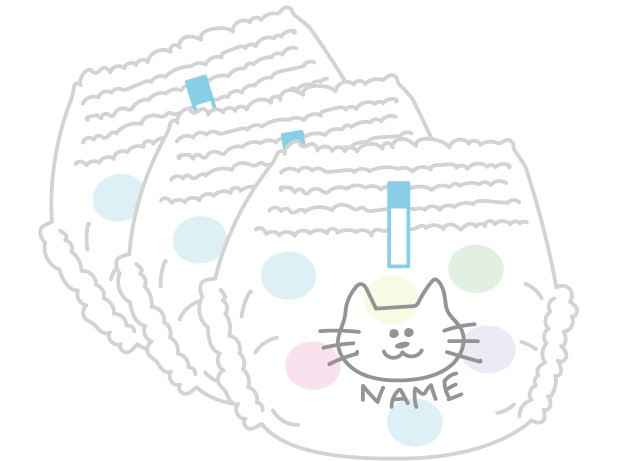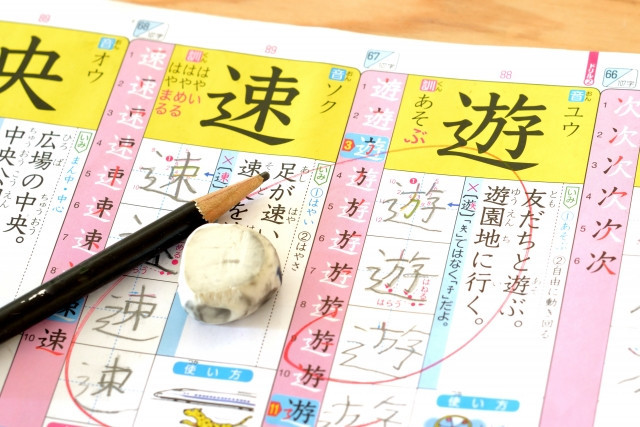Japanese names are carefully chosen by parents considering the characters' meaning and combination, how it's read and the sound. There are also some rules to be followed when addressing a Japanese person by name. Learn the basics of the structure of Japanese names, recent popular examples (and some unique ones!) and how to use them when speaking Japanese.
First published: 2022/06/30
Updated: 2023/02/28
Table of Contents
- Basic Structure of Japanese Names
- Popular Japanese Names
- Unique Japanese Names
- English to Japanese Equivalent Names
- Addressing Japanese People by Name
- Summary
Basic Structure of Japanese Names
Have you wondered how Japanese names are structured and why there’s sometimes confusion?
Surname Before Given Name
Like many countries in Asia, Japan's naming system is different from the Western naming system. Japanese names are written with the surname first and the given name last.
For example, let's look at the name of famous Japanese writer 太宰治 (Dazai Osamu).
太宰 (Dazai) represents his surname while 治 (Osamu) represents his given name.
Note that it is written as Dazai Osamu rather than Osamu Dazai which is how Western names are written.
Also note that Japanese names rarely use middle names unlike in the West. If a person in Japan has a middle name, it’s likely that they grew up in a different country or one or both of their parents are not Japanese.
Tip: If you do have a middle name and it’s on your passport, it’s recommended to include it in all documents in Japan, especially legal ones. Some people end up having issues later on when the name on the passport doesn’t match legal documents exactly. There is also confusion where to choose to put your middle name, as many Japanese people will expect that the very last part of the name is your first name.
If you use:
Last Name - First Name - Middle Name (← Some will assume this is your first name because of the placement)
So some consider writing it:
Last Name - Middle Name - First Name
Regardless of which you choose, the important thing is that you choose one and stick to it. Things get confusing on documents if you mix up the styles.
The Characters in the Name

Japan's writing system can be classified into two: Kanji, which is influenced by Chinese characters, and Kana which consists of Hiragana and Katakana.
Kanji
Most Japanese names are written using Kanji. Kanji characters can have different meanings despite sounding alike; such as the name Haru which can be written as :
-
陽 which can mean light, sun, or male
-
春 which means spring
-
晴 which means clear or sunny weather
This is how Japanese names can differ in writing and meaning even if they are pronounced entirely the same.
For more examples of first names:
-
Yoshi can be written as 吉 (good luck), 義 (righteous), and 良 (virtuous)
-
Yuki can be written as 幸 (happiness), 雪 (snow), as well as other combinations of characters for yu and ki separately; not to be confused with Yuuki
-
Jun can be written as 淳 or 純 (pure), or 潤 (prosper)
These names and characters can be a part of a longer name using a combination with other characters to further add meaning to the name. In fact, people will often describe the meaning or common use of the character when telling a person their name for the first time so that they can picture the characters used to write the name.
Hiragana & Katakana Names
Some parents choose to give their children names with no kanji but in kana instead. So taking an example from above, they may decide that their child’s name Yuki is written 「ゆき」. In that case, the meaning behind the name is not clear upon reading it; on the other hand, no one will misread it. At times, some parents may even mix kanji and hiragana in one name.
Katakana is usually used when the person’s name has a foreign origin. Most foreigners in Japan, unless from a country where their name is already written in Chinese characters, will spell out the pronunciation of their name in katakana. But some Japanese parents choose to use katakana as well. For example, the name Erika is popular both in Japan and overseas, so people can choose to use kanji, hiragana or katakana to write the name.
Gender Specific Characters in Names

Some kanji are specifically used for boy names and different ones for girl names. Thus these names make it obvious at first glance, for example on an attendance sheet for school, whether the student is a boy or girl.
For Japanese male names, they might include kanji that invoke the image of being strong or tough like a warrior while others specifically identify them as a boy or a son. For example:
-
武, which can be read as Takeshi, Mamoru, Isamu in addition to other readings, means strong or warrior. It can also be combined with other characters when read as take or mu.
-
夫, read as o, means man and is usually added to the end of a name, such as Tetsuo, Akio and so on.
-
郎, read as ro, means son and is added to the end of certain boy names, such as Jiro, Taro and so on.
For Japanese female names, they might use kanji that invoke images of something feminine or beautiful, such as flowers.
-
花, read as ka, means flower and is often added to girls names such as Erika, Kanon, etc. The kanji on its own is read Hana and is also used as a name.
-
美, read as mi, means beautiful and is used in a variety of Japanese names for girls including Emi, Mio, Misaki and so on.
Of course, nowadays, parents are getting more creative with names and don’t necessarily use kanji like the above that are gender-specific. Names that also used to be more gender specific are also being used for both boys and girls, such as Jun and Aoi.
We list the recent ranking for popular Japanese names below, but for an extensive list of names, check out our article 200+ Cool Japanese Names People Actually Use with Their Meanings.
Writer's Pick
Popular and Common Japanese Names

Common Last Names in Japanese
Common last names haven’t changed in a while. The most common last names in Japan are 「佐藤 Sato」, 「鈴木 Suzuki」 and 「高橋 Takahashi」 and have been for a good while. Other common surnames include 「田中 Tanaka」, 「伊藤 Ito」, 「渡辺 Watanabe」, 「山本 Yamamoto」, 「小林 Kobayashi」 and 「加藤 Kato」.
First names, on the other hand, differ from generation to generation. People can often tell which generation someone is from just from the first name or what characters are included in the name. For example, the name Rin has become more popular recently both for boys and girls, but it’s not a name you’d likely find in older generations even though it might be used as a nickname from a longer name.
Recent Popular Japanese first names (2022 ~ 2023)

This is the ranking of most popular names in 2022 according to a 2022 survey conducted by Tamahiyo, a media service by Benesse Corporation supporting new parents and their newborns.
Aoi and Hinata were the most popular names in 2022 for genderless names.
The top 10 names chosen by parents for their baby boys are:
| Character | Reading | Meaning & Hopes for Child |
| 1. 碧 |
あお |
blue, shining gem, bright, reliable |
| 2. 陽翔 |
はると |
run/fly towards the sun or "aim for great heights" |
| 3. 蒼 |
あおい |
blue-green, big & free like the sky and sea, nurturing |
| 4. 朝陽 |
あさひ |
morning sun, bright, generous |
|
5. 蓮 |
れん Ren |
lotus, pure, beautiful |
| 5. 湊 | みなと Minato |
harbor, where people gather, global, friendly |
| 7. 結翔 | ゆいと Yuito |
to connect people and go to great heights |
| 8. 悠真 | ゆうま Yuma |
confidence to do the right thing |
| 9. 陽向 | ひなた Hinata |
to face the sun, warmly lead others |
| 10. 樹 | いつき Itsuki |
to grow tall towards the sky |
Ao shot up to #1 from #7 the previous year, and Yuito at #7 and Yuma at #8 are newcomers to the top ten compared to the previous year.
But by sound only (regardless of the characters used to write the name), the top 5 most popular boy names were: Haruto, Riku, Yuito, Aoto, Minato
The top 10 names chosen by parents for their baby girls are:
| Character | Reading | Meaning & Hopes for Child |
| 1. 陽葵 |
ひまりHimari |
full of energy like the sun, grow like a sunflower (himawari) |
| 1. 凛 | りん Rin |
strong, dignified, elegant |
| 3. 結菜 |
ゆいな |
energetic, cute, connects people |
| 4. 芽依 |
めい Mei |
to sprout, challenge new things, have strong principles |
|
5. 詩 |
うた Uta |
poem, poetry, song, sensitive and expressive |
| 6. 陽菜 |
ひな Hina |
calm, gentle, warm, sincere |
| 7. 葵 | あおい Aoi |
a flower (looks like a hibiscus), cute, sincere, honest, strong |
| 8. 莉子 |
りこ Riko |
logical, calm, puts people at ease |
| 9. 紬 | つむぎ Tsumugi |
connected, fulfill dreams, connect with people |
| 10. 咲茉 | えま Ema |
creative, strong, elegant |
Himari claimed the #1 spot for the 7th year in a row!! Uta at #5 and Ema at #10 are newcomers to the top 10 compared to the previous year.
And by sound only, disregarding the characters chosen for the name, the top 5 most popular girl names were: Ema, Mio, Mei, Sana, Rio
※ Tamahiyo, "2022 Tamahiyo Baby Name Ranking"
Unique Japanese Names - "Kira Kira Names”

キラキラネーム, or “Kira Kira name” are names that stand out a lot by how they are read and pronounced - after all “kira kira” translates to shiny in English. But what kind of names are they? Kira kira names can be anything from names that haven’t traditionally been used before, to names with interesting kanji that are read differently than expected.
It’s easier just to give you examples. These are not necessarily common names, as most are extreme:
-
Names taken from popular characters such as Pikachu (光宙), Naruto (ナルト) and 泡姫 (Written Awahime but read as Ariel - Awahime translates to “bubble princess” as in the original story of the Little Mermaid, the mermaid princess turns to sea foam or bubbles when her love is unrequited)
-
Tetris written as 凸 which looks like one of the blocks in the game
-
Cute names taken from things parents like such as Mocha and Cocoa or the example in the photo above, where the parents love sakura (桜, cherry blossoms) and want their son to shine (輝く) so they named their son Ouki 桜輝 which is not a common name while 桜 (Sakura) for girls is.
-
Names with kanji usually read as other things but with original reading: 一番 (Usually read ichiban meaning number one but read as “Toppu” or Top), 偉人 (usually read ijin meaning great person but read as “Gureito” or Great)
These Kira Kira Japanese names totally stand out and shine on their own but it affects the lives of those children who bear the name more than their parents who chose it. On one hand, these names certainly make an impression and are hard to forget, but sometimes it draws unwanted attention - whether it be from people unable to say the name correctly at first try, teasing from other kids, or being called out as a Kira Kira name to their face or behind their back. Some people go as far as to change their name when they get the chance.
English to Japanese Equivalent Names
Some Japanese names are harder to pronounce for people unfamiliar with the Japanese language. For Japanese people who live overseas or multiethnic families, this is another aspect to consider when choosing their kid’s names. Some people will give an English first name and Japanese middle name, or vice versa. Or just have a name they go by depending on where they are at the time.
There are also Japanese names that can easily be used as an English name and vice versa. Examples of these are:
-
Hana - Hannah or Hanna
-
Airin - Eileen or Irene
-
Maya, Erika (Erica), Karen, Maria, Anna
-
Jin - Gene or Jean (However, Jin is usually a boy’s name in Japanese)
-
Shion or Shun - Sean
-
Ken, Ray, Jo, Aran (Alan), Reon (Leon)
Many mixed race kids have these names, or parents who want their names to be easily accessible in both languages.
If your name doesn't have a Japanese equivalent, then you will just write your name in Katakana.
For example, Jessica would be ジェシカ (Je-shi-ka) and Michael would be マイケル (Mai-ke-ru).
If you have Chinese characters in your name, you will still have to use the original pronunciation in official documents and situations. However, for casual use, you can refer to the Japanese pronunciation of the characters.
Some Rules when Addressing Japanese Names

Japanese names aren't used or addressed as it is, like you’d do in English. There are certain rules followed and honorifics used that you must learn before addressing anyone in Japan.
Some of the Typical Rules
In Japan, the way you call someone can measure your familiarity with the person. Most certainly when you call someone by their first name in Japan without properly being acquainted would result in an uncomfortable situation and be what most Japanese would consider rude.
Given names can be only used by close friends and families in Japan and it is not common in the workplace. Most likely each person would be referred to with their surnames while in a professional workplace, titles can be used to replace their names. For example:
-
If a person's name is Akutagawa Ryunosuke, you would refer to that person as Akutagawa-san if you're not personally acquainted.
-
If you want to refer to a person with a higher authority in a workplace, you could refer to that person with their title like Bucho for the head of the department, Sensei for teachers, doctors and other professionals, and Senpai for upperclassmen or older colleagues.
Titles
Titles or honorifics in Japan are attached with the names to indicate respect and acknowledgement for the person. Some of the most commonly used titles are -san, -sama, -kun, -chan, -senpai, and -sensei.
-
San - This is the most commonly used honorifics in Japan. You can use it regardless of the person's age, gender, and status. Its equivalent in English is Mister and Miss/Mrs. If a person's name is Nakahara Chuya, you can address that person as Nakahara-san if you're not acquainted and Chuya-san if you're more familiar and they allow it.
-
Sama - This is the most formal way of addressing someone in Japan. You mainly use it for someone who has a superior status or for your clients and customers. It is also used for Japanese gods referred to as 「神様 Kami-sama」. Its closest equivalent in English is Sir and Madam. If a person's name is Mori Rintaro, you need to address them by their surname like Mori-sama. If you don’t know their name and they are a customer, you would call them 「お客様 okyaku-sama」.
-
Kun - This is mainly used for younger men, men that are your friends, or men that are lower than your position at work and you have a closer working relationship. It can also be used for younger women in special cases. If a person's name is Nakajima Atsushi, you can either address that person as Nakajima-kun or Atsushi-kun.
-
Chan - This is mainly used for children and younger women. This is also used if you're familiar with the person you're addressing. If a person's name is Tanizaki Naomi, you can address that person as Naomi-chan. Note that this is rarely used with full last names, but is sometimes used with shortened last names, like Tani-chan for Tanizaki.
-
Senpai - As mentioned previously, this is used for addressing upperclassmen or older/superior colleagues. It is mainly used for Senpai-Kouhai (upperclassmen/lowerclassmen) relationships in schools and at workplaces. If a person's name is Kunikida Doppo, you can address that person as Kunikida-senpai or Doppo-senpai if you have a closer relation.
-
Sensei - As mentioned previously, this is used for addressing people with professions like teachers and doctors. If a person's name is Edogawa Ranpo, you can address that person as Edogawa-sensei.
Summary

Names are valuable in Japan just like any name in the world. Each name has its own meaning and purpose that the person bears throughout their life. Thus you'll hear people ask what characters they use in their names, and you might even hear a 「いい名前!」(Ii namae! - Nice name!).

































